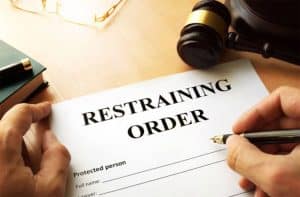Final Restraining Order Attorneys Ocean County NJ
Serving Domestic Violence Clients in FRO Proceedings in Brick, Toms River, Lakewood, Seaside and across Ocean County, NJ

How does a case for a restraining order get started?
In the most common cases, the basis for a restraining order is that there was a past or present dating or marital relationship between two people. At some point during that relationship or thereafter, one party alleges that the other committed an act of domestic violence. After the alleged act of domestic violence, the party seeking protection from abuse goes before a judge and requests that a temporary order be issued. The Plaintiff (party seeking the order) tells the judge his or her version of the events and explains to the judge that she is in fear for her safety.
The Judge will issue an order of temporary protection (TRO) if he or she finds that the allegations warrant such an order. If this occurs, the judge will issue the temporary restraining order and direct that a police officer serve the order on the Defendant. Also contained in the order will be a date for a Final Restraining Order (FRO) hearing.
What happens at, before and during the FRO hearing?
After the notice is served upon the Defendant, the order becomes enforceable by law but will not become final until a hearing occurs in the Superior Court, Family Division in the county in which the alleged incident took place or where the TRO was filed and issued.
A final hearing to determine the truth or veracity of the complaint will take place before a Superior Court Judge in Family Court. The date will be set forth in the temporary order and usually takes place in one to two weeks. Any person seeking legal counsel must do so quickly, as the court will not adjourn the case for any great length of time. If an attorney enters his or her appearance, he will obtain discovery, review the order, and attend court.
At court, the Plaintiff must prove the allegation of alleged abuse and demonstrate that he or she is in fear of the Defendant. Attorneys often enter the case on behalf of either the Defendant or Plaintiff and can:
1) agree to an alternative to the restraining order and dismissal of the order;
2) agree to the restraining order with or without modification;
3) conduct a hearing to prove or disprove the allegations.
The Role of Attorneys in Restraining Order Case
Attorneys can be invaluable in domestic violence situations, as they can communicate on behalf of the parties. Experienced attorneys can also present proofs, cross-examine witnesses, and conduct the hearing within the rules and procedures of the court. We know court can be a scary experience, whether you are the Plaintiff or Defendant. Our attorneys can take on the burden and capitalize on our own experience when representing you. After all, once a restraining order becomes final, it is very difficult to change the substance of the order without the Plaintiff’s consent.
If you have children, the order can impact custody and visitation, and the Judge may impose restrictions on parenting time. Final orders also impact people in other ways. For instance, it could restrict where you live, where you can be (ie. you can be excluded from your children’s school), whether you are allowed custody, how you pay or receive child support and your finances. If you are involved in a domestic dispute, protect your rights and contact our office today.
Contact Trusted Family Law Attorneys Today
Peter and Alex – attorneys at Bronzino Law Firm, both were born, raised and reside in the Ocean and Monmouth County area. Both have also served in clerkships for local family law judges. Their familiarity and commitment to members of local communities lends itself as a critical component of what drives their successes in court proceedings in Brick, Toms River, Lakewood, Seaside and across Ocean County, NJ.
Call us at 732-812-3102 to schedule a meeting at one of our offices conveniently located in Brick and Sea Girt or fill out the online form and we’ll get back to you shortly.







